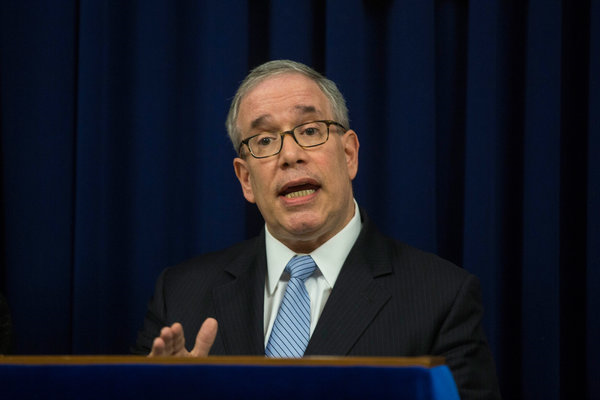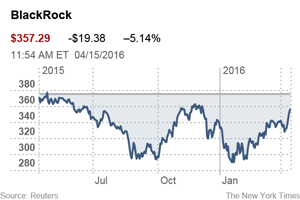
Business Day
BlackRock Wields
Its Big Stick Like a Wet Noodle on C.E.O. Pay
Fair Game
By
GRETCHEN
MORGENSON
APRIL
15, 2016
|
TimesVideo |
|
|
|
Laurence Fink, chief
executive of BlackRock, explains why earnings declined for the
world’s largest asset management firm.
By CNBC on Publish Date April 14, 2016. Photo by CNBC.
|
For several years, Laurence D. Fink, chairman and chief executive of
BlackRock, the money management
giant, has been on a
crusade, exhorting corporations
to change their short-term ways. Executives should forgo tricks that
reward short-term stock traders, he argues, like share buybacks
purchased at high valuations. Instead, corporate managers should focus
on creating value for long-term shareholders.
It’s an
admirable argument that has won Mr. Fink wise-man status on Wall Street and
accolades in the press. Hillary Clinton has echoed his ideas on the campaign
trail.
| |
Fair Game
A
column from Gretchen Morgenson examining the world of finance
and its impact on investors, workers and families
See More »
|
| |
|
Certainly, as the head of
BlackRock, Mr. Fink wields an
outsize stick. With $4.6 trillion in assets and ownership of shares in
roughly 15,000 companies, BlackRock is the world’s largest investment
manager.
But if Mr. Fink
really wants to get the attention of company executives on stock buybacks and
other corporate governance issues, why doesn’t BlackRock vote more often against
C.E.O. pay packages of companies that play the short-term game?
Executive compensation is inextricably
linked to the shareholder-unfriendly actions Mr. Fink has identified; voting
against pay packages infected by short-termism would help curb the problem.
But BlackRock
rarely takes such a stance. From July 1, 2014, to last June 30, according to
Proxy Insight,
a data analysis firm, BlackRock voted to support pay practices at companies 96.2
percent of the time.
On pay issues,
anyway, Mr. Fink’s big stick is more like a wet noodle.
BlackRock’s
“yes” percentage runs far higher than that of other money managers that express
concern about corporate responsibility.
Domini Funds supported pay practices only 6
percent of the time during the period, while
Calvert Investments did so at 46 percent of
companies.
Public pension
funds are also big on rejecting pay policies, Proxy Insight said. Since 2011,
the State Universities Retirement System of Illinois has voted no 63 percent of
the time while the city of Philadelphia rejected 52 percent of pay policies it
voted on.
|

Funds overseen by Scott
M. Stringer, comptroller of New York City, voted against company pay
practices 33 percent of the time.
Credit Hiroko Masuike/The
New York Times |
Scott M. Stringer, the New York City
comptroller, said that in the 2015 proxy season, the five pension funds under
his oversight have voted against pay practices 33 percent of the time. He added
that his funds voted their shares directly “to avoid the risk that money
managers may cast proxy votes that aren’t aligned with the long-term interests
of our beneficiaries.”
“This is
especially true,” Mr. Stringer added, “when it comes to votes on executive pay,
political spending disclosure and climate risk.”
It’s true that
BlackRock’s voting record is not much of an outlier compared with some other big
money managers’. Fidelity Funds, known for keenly supporting corporate
management in its proxy voting, said yes on pay 96 percent of the time, Proxy
Insight said. Vanguard’s most recent record was to support 95 percent of pay
practices; Putnam Investments did a bit better, voting yes on 93 percent.
But none of
these firms’ chief executives have taken up the public fight against short-termism
that Mr. Fink has.
Even at
companies that have made big repurchases of their shares in recent years,
including Yahoo, General Electric, Home Depot and IBM, BlackRock has voted yes
on pay. BlackRock also supported the pay policy under fire at Valeant
Pharmaceuticals International, the crippled drug maker.
Ed Sweeney, a
BlackRock spokesman, provided this statement: “Executive compensation that is
disconnected from company performance is a symptom of broader governance
failures. When governance issues are identified in companies, we’ve found that
engaging with senior management and directors is the most effective way to
catalyze change.”
Last year, he
added, the firm “engaged with approximately 700 companies in the U.S. and
executive compensation was a focus of 45 percent of those meetings. If we
determine that issues will not be remediated through engagement, we vote against
specific proposals as well as the directors on related committees.”
But
Stephen
Silberstein, a retired software company founder and a BlackRock investor, isn’t
buying this argument. So he wrote a shareholder proposal addressing BlackRock’s
record on pay that the firm’s stockholders will vote on at their annual meeting
on May 26.
The proposal
would require BlackRock’s board to issue a report to shareholders by December
that “evaluates options for bringing its voting practices in line with its
stated principle of linking executive compensation and performance, including
adopting changes to proxy voting guidelines, adopting best practices of other
asset managers and independent rating agencies, and including a broader range of
research sources and principles for interpreting compensation data.”
In an interview,
Mr. Silberstein told me why he focused on BlackRock: because it’s huge, its
record on pay votes is bad and he is a shareholder. “I’ve been interested in
income inequality for quite some time,” Mr. Silberstein said. “On the bottom
end, it’s raising the minimum wage and on top end, it’s reducing the pay of
C.E.O.s.”
Perhaps
BlackRock hesitates to call out other chief executives on their pay because of
Mr. Fink’s own compensation, which is lush. In 2015, he received $26 million, an
8 percent increase from the previous year; BlackRock’s net income, meanwhile,
rose just 2.7 percent during that period.
In his annual
letter to shareholders, Mr. Fink said his
firm believed “in a pay-for-performance culture, aligning employee incentives
and compensation with company-level performance.”
As You Sow, a nonprofit organization that
promotes shareholder advocacy, disagrees. In a recent
study, it concluded that Mr. Fink was the
39th-most-overpaid chief executive among 100 large companies.
Mr. Silberstein
says he knows his is an uphill battle. Nevertheless, he is hopeful that
shareholders will vote for his proposal. “I’m going and talking to every pension
fund financial manager I can see,” he said.
Mr. Fink has
done a service by highlighting corporate activities that compromise the
potential for long-term shareholders’ prosperity. This is an important
conversation to have.
But talking the
talk is one thing, walking the walk another. Why not lead the parade, BlackRock,
instead of merely waving from the sidelines?
A version of this article appears in print on April 17, 2016, on page
BU1 of the National edition with the headline: Wet Noodle Where a
Stick Ought to Be.
© 2016 The
New York Times Company

